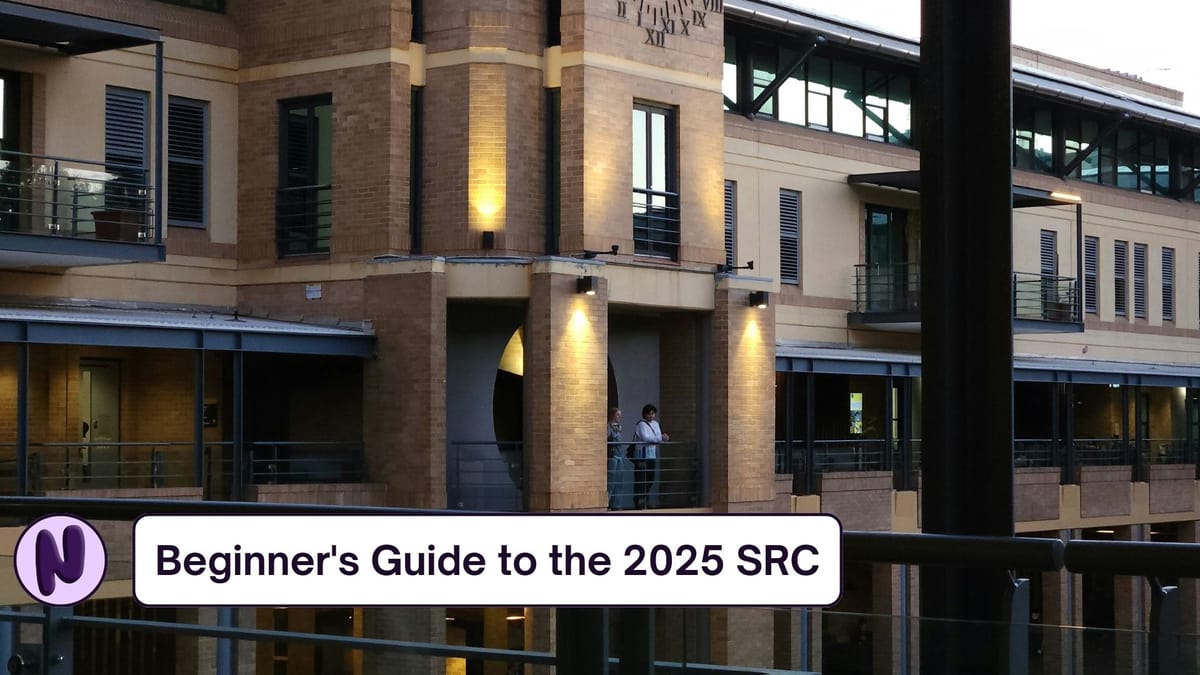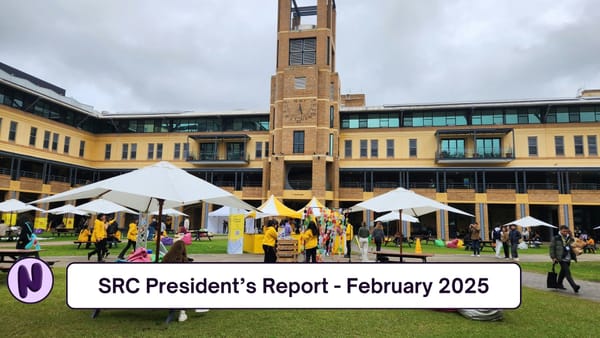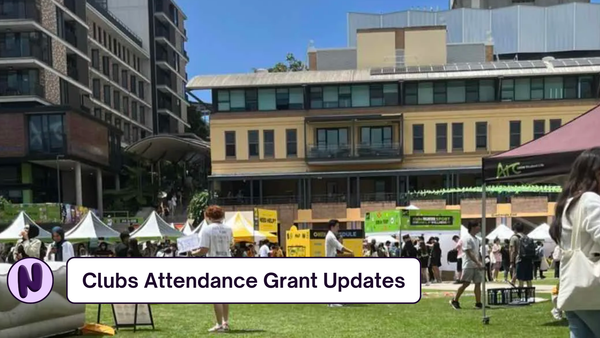Beginner's Guide to the 2025 SRC
An updated guide to the SRC for the 2025 academic year.

Whether you're a first year trying to find advice, or a seasoned StuPol veteran, the SRC is often a daunting organisation to navigate. We've put together this reference guide to help you understand what's going on.
What is the SRC?
The SRC, or Student Representative Council, is composed of 27 elected members, all of whom are students at UNSW. This includes:
The President
Responsible for convening and chairing SRC meetings, the President acts as the official spokesperson for the Council, and the primary point of contact between the SRC and the various other Boards and Committees at UNSW.
The General Secretary
Head of clerical and administrative responsibilities, the General Secretary condenses relevant information for SRC use, identifies and facilitates the provision of resources to Council projects, coordinates a central calendar of events and functions, and takes minutes for, and counts votes in, SRC meetings.
Three General Office Bearers and eight Collective Office Bearers
Representing students at Council meetings, raising and discussing issues affecting students, and recommending proposals to the SRC, OBs chair and facilitate meetings of their respective Collectives, and assist with the general administration and organisation of all SRC events, including:
- The Education Officer, responsible for promoting access to and quality of education at UNSW.
- The Welfare Officer, who supports the principle of universal student welfare through awareness and campaigning.
- The Environment Officer, responsible for coordinating campaigns that improve the sustainability and environmentalism of Arc, the SRC, and UNSW.
- The International Students’ Officer, who acts to ensure international students’ issues are adequately represented on Council.
- The Indigenous Officer, who acts as a spokesperson on Indigenous issues, and ensures the issues affecting Indigenous students are adequately represented in the SRC.
- The Queer Officers, who act as spokespeople for Queer students, creating awareness and visibility on campus to ensure that Queer issues are adequately represented on Council. This portfolio has two seats.
- The Students with Disabilities Officers, spokespeople who advocate for support for students with disabilities, in particular, maintaining accessibility to coursework, welfare, physical access, and general accessibility at UNSW. This seat can be split between two members.
- The Women’s Officer, who works to support women in higher education at UNSW and ensures feminism and women’s issues are adequately represented in the SRC.
- The Ethno-Cultural Officer, who acts as a spokesperson for students from diverse ethnic, linguistic and cultural backgrounds, including People of Colour (POC), ensures the Council recognises the diversity of experiences of people from ethnically diverse backgrounds, and advocates for a university that is tolerant, respectful, and free of racism.
Three Paddington Campus Office Bearers
The Paddington Representation Officer, Paddington Domestic Officer, and Paddington International Officer act as the major points of contact between Paddington students and the various Boards and Committees at UNSW, coordinating events and initiatives, and ensuring a strong and equitable voice in the SRC for Paddington students.
Twelve Councillors, with six from each Electorate
Representing students at Council meetings, raising and discussing issues affecting students, and promoting the activities and campaigns of the SRC to students. At least four of these Councillors, two from each electorate, must be women or gender diverse. Electorate A includes the Arts, Design & Architecture, Law, and Business Schools at UNSW, while Electorate B includes the Engineering, Medicine, and Sciences Schools.
Why do we need an SRC?
Despite education being the main purpose of universities, students are often left out of the decision-making process for major changes, or given an extremely limited scope to work with. The SRC exists to lobby the university on behalf of the student body, with the aim of improving the university as both an educational and social resource. The SRC also exists to ensure adequate representation for often underrepresented groups.
Elections run every year in Term Three, and all Undergraduate Students are eligible to vote in the online polls, although some restrictions apply depending on the positions of Office Bearers, as defined by Arc Regulations.
The positions of International, Indigenous, Students with Disabilities, and Ethno-Cultural Officers may only be run for, and voted by, students who Arc recognises as members of these groups.
The Queer Collective maintains an independent election, meaning only members of the Collective may run or vote for the positions of the Queer Officers.
Only students whose main program is undertaken at the UNSW Art & Design campus may run or vote for the positions of the Paddington Representation Officer, Paddington Domestic Officer, and Paddington International Officer.
Who’s on the 2025 SRC?
Unfortunately for those of us who had finally figured out how things worked, the 2024 election saw a major shakeup in the composition of the SRC.
The largest ticket of the 2025 SRC is Left Action, holding 12 of the 26 seats this year, including the Education, Welfare, and Environment Officer positions. They primarily campaigned on welfare policies, including a $100/week rent cap and free meals on campus, as well as pushing for an end to the trimester system, divestment from weapons manufacturing, and an end to coal and gas projects in Australia.
365 is a new ticket led by former Ethno-Cultural officer (and former Noise coordinator) Diya Sengupta. In their inaugural year, they secured 4 seats, including the Presidency, Women's Officer, and International Students Officer and a councillor A positions. They campaigned on ending Fit To Sit, stronger mutual aid initiatives, fossil-free UNSW, and led the recent EGM for Arc to divest from arms manufacturing.
Revive and Together Again represented a fracturing of the former Unity ticket, resulting in a significant decline in seats on the 2025 SRC. Revive holds 2 councillor positions, while Together Again only holds the General Secretary seat and 2 councillor positions. Both tickets campaigned on similar platforms, including digital student ID cards, cultural options for College dining halls, and an end to trimesters.
Another new ticket, EDGE, managed to secure the ethno-cultural officer seat. EDGE ran a campaign to reduce cuts to clubs, improve lecture resources, and improve student engagement with the SRC.
Several independents also succeeded in their campaigns, including both Queer Officers and all 3 Paddington office bearers. It is to be noted, however, that these seats are often held by independents.
Why should I care about any of this?
The SRC is the largest student organising body at UNSW and is the main way the university hears student voices. The President of the SRC sits on governance bodies at all levels, including Academic Board and the Gendered Violence Steering Committee. The President also has the ability to delegate other SRC representatives to these meetings. With upcoming policy changes around the trimester system, international students facing new challenges from the government, and politicians becoming increasingly hostile to vulnerable communities and groups, it's vital that representatives actually represent the students of the university.
Additionally, the faces you're seeing in student politics now are the next generation of “real” politicians, with several highly active student politicians going into high-level positions. Getting to know them and what they stand for at this level, will provide an indication on where the future of the country is going.




